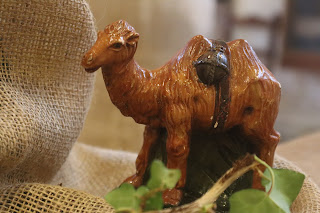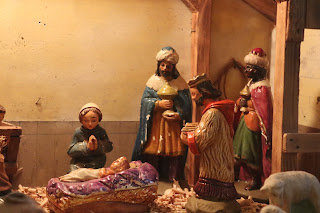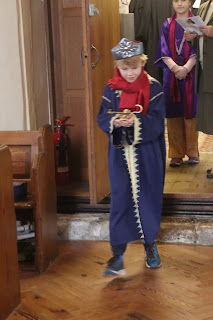-
Malachi 3:1-5 A reading from the book of the prophet Malachi. Thus says the Lord God: See, I am sending my messenger to prepare the way bef...
-
Tom Cooper Price at the Piano Two recent events have helped to move us further towards the new rooms project. On March 3rd the aftern...
-
This evening at 6pm we had our service of Carols and Readings, following the traditional pattern. We gathered on a wet and windy evening to ...
-
The annual Church Fete was held this year in a different location, and in very wet weather! We were unable to use the Vicarage Field this ye...
-
Today was misty and murky and quite a few people were stuck at home, hemmed in by the floods after all the rain we have had. Fr Roger preach...
-
Exodus 24:12-18 A reading from the book of Exodus. The Lord said to Moses, “Come up to me on the mountain and wait there; I will give you ...
-
This Sunday our Eucharist included the lighting of the last of the four Advent candles, Christmas is nearly here! The church has now been de...
-
A cold and unwelcoming day outside but not in St Mary's. Fr Chris was busy elsewhere on his other duties so we had the pleasure of Fr R...
-
Our Matins Service today was taken by Father Roger, as Father Stephen was away. The Psalm for the day was Psalm 14, and the Readings from t...
-
Below is a link to the Church of England website with various prayers for use at this time which you may find helpful at this time. http...
 |
| The wise men arrived at the crib, they parked their Camels outside! |
 |
| The Star precedes the Wise ones with their gifts to the Crib |
Jesus came as a baby at Christmas. The Epiphany season is about everyone seeing what Jesus is really all about.
Today we have the Wise Men, following a star to find baby Jesus. It doesn’t say there were three Wise Men, it doesn’t say they were actually kings, but it says that they were from the East. That means that they were not Jewish, not from God’s people, they were outsiders. So we learn that Jesus has come for everyone! They were a group of Wise Men, bringing three gifts.
If the Wise Men saw the star and then undertook a long difficult journey, baby Jesus would have grown up a bit before they arrived. In fact, we read that Mary and Joseph had moved out of the stable and into a house by the time they arrived. The Wise Men, it has been thought, were scholars from the ancient Zoroastrian religion of Persia. Astronomers or astrologers, studying the stars, but they were people trying hard to get to the truth, and that’s normally a very good thing.
These days we have Professor Brian Cox studying the heavens. He points out that the stars have made us what we are, and our star, the sun, keeps us alive. At one level that is doubtless very true. But he has said that we don’t need to invent any other gods apart from the stars, and we would certainly argue with that. A star will not inspire us to love and morality, good behaviour, and hope for the individual, or anything non-technical. Allan Jenkins, who used to be the priest-in-charge here, and I, both studied Physics at a certain college in London, and our professors and teachers contained a surprisingly large sprinkling of Godly people.
You may remember that before Archdeacon Luke came, we had a temporary Acting Archdeacon. He was called David Twinley, and he gave us an address on the Greek concept of kenosis. I’m sure you recall it - vividly? That idea is in St Paul’s Letter to the Philippians, chapter 2. It is about God wanting to come among us on earth in Jesus’ life, and so the second person of the Trinity, (who is the Word of God) had to ‘empty himself’, and ‘lay aside his heavenly glory’, to do the job. The Father is the first person of the Trinity, and the Holy Spirit the third. The second person, the Word of God, would ‘empty himself and lay aside his heavenly glory’ to be alongside us in Jesus.
Before this gets boring, we’ve found a use for the star. It can be a sort of picture.
Long ago, God could sometimes seem to be a bit like our star, the sun. God there, but far away, having made us, loving us, but a long way away. Giving us life…. but a long way away.
To get close, God must lay aside his glory and empty himself. How do we show that? Well, we can chop off the spiky bits of the star, and we get….. Doesn’t that look nice? What do you mean, ‘No?’
We’ll have to try again, chop more off, so that the star can really come down among us. There’re still some little bumps on it. We’ll chop them off! You can’t see very well so I’ve coloured in where we’ve chopped them, to make it clear.
I think that some of you children are the sort to give a good kicking to a truncated icosahedron. Does anyone want to confess?
Well we’ll chop the bumps off. Can anyone guess what we will get? A football. That is really down-to-earth. In fact, it hits on the ground rather a lot, it has a rough time, it gets kicked around.
That can remind us that God coming down to earth was costly. Jesus would get hurt and killed when he came to help us.
Even while Jesus was still a baby, Mary and Joseph had to become refugees in Egypt to save him from nasty King Herod. But it would all end well, and if it hadn’t, we wouldn’t be in church today, and there wouldn’t be a Church!
(We went from stellated icosahedron to icosahedron to truncated icosahedron.)
Fr Roger
Service Times
10:00am Family Service
Second Sunday in the Month
10:00am Parish Eucharist
Third Sunday in the Month
08:00am Holy Communion
08:00am Holy Communion





























